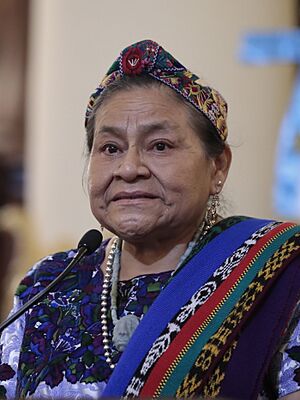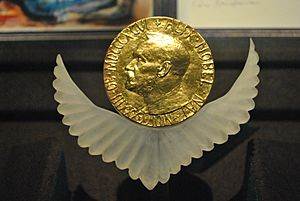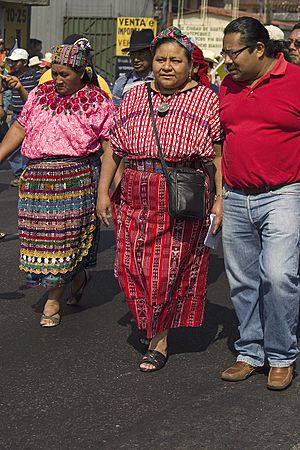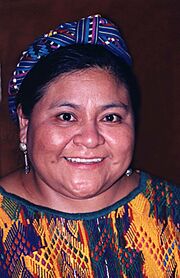Rigoberta Menchú facts for kids
Quick facts for kids
Rigoberta Menchú
|
|
|---|---|

Menchú in 2024
|
|
| Born |
Rigoberta Menchú Tum
9 January 1959 Laj Chimel, Quiché, Guatemala
|
| Occupation | Activist, politician |
| Political party | Winaq (founder) |
| Spouse(s) |
Ángel Canil
(m. 1995) |
| Children | 2 (1 deceased) |
| Parents |
|
| Awards | Nobel Peace Prize in 1992 Prince of Asturias Awards in 1998 Order of the Aztec Eagle in 2010 |
Rigoberta Menchú Tum (born 9 January 1959) is a famous human rights activist from Guatemala. She is a member of the K'iche' Maya, an Indigenous group in Guatemala. Menchú has spent her life speaking up for the rights of Guatemala's Indigenous peoples, especially during and after the Guatemalan Civil War (1960–1996). She also works to promote the rights of Indigenous people all over the world.
For her incredible work, she received the Nobel Peace Prize in 1992. She also became a UNESCO Goodwill Ambassador and received other important awards. Menchú shared her life story in the book I, Rigoberta Menchú. She later founded Guatemala's first Indigenous political party, Winaq, and ran for president of her country in 2007 and 2011.
Contents
Early Life and Family
Rigoberta Menchú was born into a poor Indigenous family in a rural part of Guatemala. She is of K'iche' Maya descent. Her family, like many other Indigenous families, had very little land to farm. Her father, Vicente, was a well-known activist who fought for the rights of Indigenous farmers. Her mother, Juana, was a traditional midwife who used medicinal plants to help people.
Menchú's parents taught her about both Catholic and traditional Maya beliefs. From her mother, she learned the importance of living in harmony with nature and keeping her Maya culture alive.
Menchú grew up during a very difficult time in her country's history. The Guatemalan Civil War was a long and violent conflict that deeply affected many people, especially Indigenous communities. Tragically, Menchú's father, mother, and two of her brothers lost their lives during this conflict because of their work to help their community. These sad events inspired Menchú to dedicate her life to fighting for peace and justice.
A Voice for Her People
From a young age, Menchú worked alongside her father to help Indigenous farmers through a group called the Committee for Peasant Unity. She was inspired by her mother to stand up for her beliefs, even when it was difficult. She believed that many of the problems her people faced came from unfair treatment and issues over land ownership.
Activism and Exile
As the civil war continued, Menchú became a powerful voice against the human rights abuses happening in Guatemala. Many of these abuses were directed at Indigenous people.
In 1981, Menchú's activism made it too dangerous for her to stay in Guatemala. She was forced to leave and went to Mexico, where she found safety. Even from Mexico, she continued to organize and speak out against the problems in her home country. She helped co-found a group called the United Republic of Guatemalan Opposition to fight for Indigenous rights.
A year later, in 1982, she told her life story to the author Elizabeth Burgos. The story became a famous book called I, Rigoberta Menchú. The book was translated into many languages and helped people all over the world understand the suffering of Indigenous people in Guatemala. It made Menchú an international symbol of peace and resistance.
Working for Peace
After the civil war ended in 1996, Menchú served as a Goodwill Ambassador for the Peace Accords in Guatemala. These were agreements that officially ended the long conflict. She also continued to seek justice for the many people who had been harmed during the war. She filed a complaint in a court in Spain in 1999, hoping to bring attention to the events that happened in Guatemala.
Leading in Politics
Rigoberta Menchú wanted to give Indigenous people a stronger voice in their country's government. In 2007, she announced that she would form an Indigenous political party and run for president. She was the first Maya Indigenous woman to ever run for president of Guatemala.
Although she did not win the election in 2007 or when she ran again in 2011, her party, Winaq, became the first official Indigenous political party in Guatemala's history. This was a major step forward for Indigenous representation in the country.
Global Impact
Menchú's work has been recognized all over the world. Her efforts have helped bring global attention to the rights of Indigenous communities.
Nobel Peace Prize
In 1992, Rigoberta Menchú was awarded the Nobel Peace Prize. She received the award for her "work for social justice and ethno-cultural reconciliation based on respect for the rights of indigenous peoples." At the time, she was one of the youngest people to ever receive the prize.
Work with International Organizations
In 1996, Menchú was named a UNESCO Goodwill Ambassador. In this role, she worked to improve education, health care, and human rights for Indigenous people around the world.
In 2006, she helped create the Nobel Women's Initiative with five other women who had also won the Nobel Peace Prize. The group works together to support women's rights and promote peace and justice globally.
Menchú is also a member of an organization called PeaceJam, where Nobel Prize winners mentor young people and inspire them to become leaders for peace. She continues to travel the world, speaking about important issues like social inequality and climate change.
Awards and Legacy

Rigoberta Menchú has received many awards for her work. Her life and activism continue to inspire people everywhere.
Honors
- 1992 Nobel Peace Prize for her work for social justice for Indigenous peoples.
- 1996 Peace Abbey Courage of Conscience Award.
- 1998 Prince of Asturias Prize for helping to improve the lives of women and their communities.
- 2010 Order of the Aztec Eagle, a high honor from Mexico.
Books
- I, Rigoberta Menchú (1983)
- Crossing Borders (1998)
- The Girl from Chimel (2005)
- The Honey Jar (2006)
- The Secret Legacy (2008)
- K'aslemalil-Vivir. El caminar de Rigoberta Menchú Tum en el Tiempo (2012)
See also
 In Spanish: Rigoberta Menchú para niños
In Spanish: Rigoberta Menchú para niños
- List of civil rights leaders
- List of peace activists
- List of female Nobel laureates
- List of feminists
 | Roy Wilkins |
 | John Lewis |
 | Linda Carol Brown |



